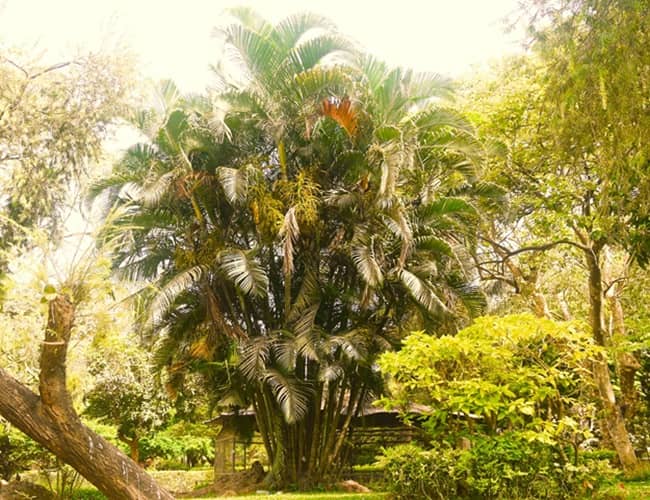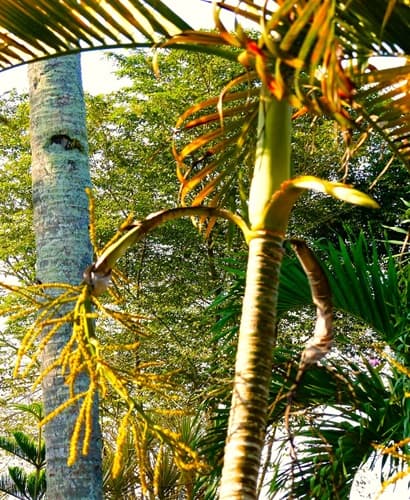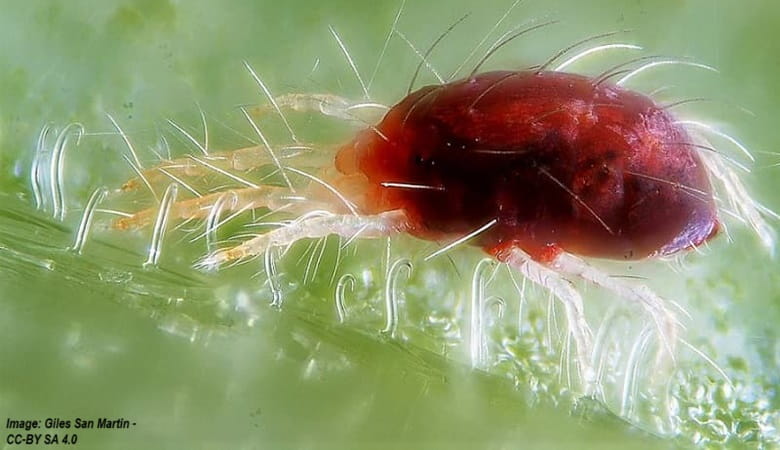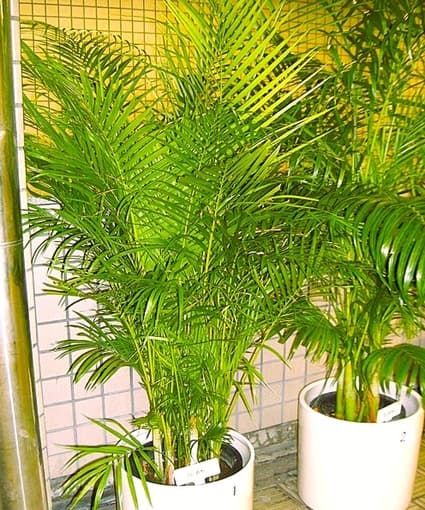- Home
- So Many Species
- Golden Cane Palm
Golden Cane Palm Tree
The golden cane palm tree Adds Tropical Beauty to your home. Dypsis lutescens is also known as the areca palm, butterfly palm, or bamboo palm.
Were you looking for one? Or maybe already have one, yet you want more details. Either way, we're here to help you out.
The golden cane palm tree is native to Eastern Madagascar. Naturally growing at silty riversides. With its long-time, world-wide popularity, it's been regularly sourced for nursery sellers. Its native environment has also been cleared for agricultural & development needs.
So, sadly it's now threatened in its endemic natural habitat.
Loved For its Gorgeous Looks, especially For Growing Indoors, but also Planting It Outside in the Right Climate. If you're thinking You'll Buy One, we'll let you in on the particulars of:
- How it looks including How Tall it Gets
- Its Basic Care Needs
- Its Best Growing Zone
- Golden Cane Problems you could encounter
Feeling overwhelmed by palm tree problems or confusing information?
You’re not alone. At Mission: Palm Trees, we help everyday palm lovers understand, grow, care for, and enjoy palms without puzzling jargon or exhausting research.
We Make Palm Tree Details Fun to Know
Best Environment for the Golden Cane Palm Tree
Since the Golden Can Palm Tree, Dypsis lutescens, is native to warm, humid rainy forests of Madagascar, it's not at all cold-hardy. The USDA Hardiness Zones it easily does well in are only 10b & 11.
But many have grown this palm in Zone 10a successfully. It seems to be able to endure temperatures down to 25°F/-3.9C.
- They've protected it during sudden freezing weather.
- If it does get Freeze Damage, it has ways of surviving.
Do you live in a cold winter climate, but you love this palm and still want it?
- Yes, you will be able to enjoy the beauty of a golden cane palm tree.
- Since it's Well-Suited to Grow Indoors as a palm houseplant.
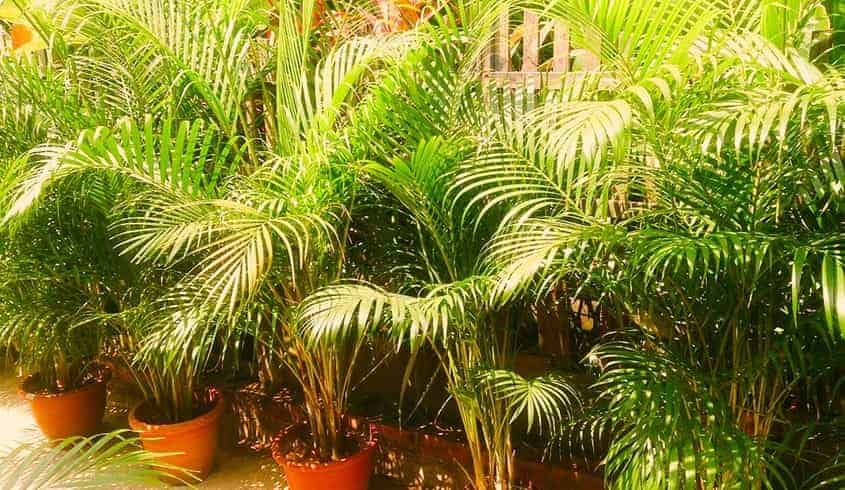 Butterfly Palms ready to Go Home for the Landscape or Going into a Decorative Container.
Butterfly Palms ready to Go Home for the Landscape or Going into a Decorative Container.Photo: Mokkie - CC BY-SA 4.0
The Awesomely Beautiful Appearance
Of the Golden Cane Palm
Whether you'll be able to plant Dypsis lutescens in Your Tropical Landscape, or choose to display it to enhance your indoor space, it's sure to add that tropical beauty to your life.
For helping you decide, let's look into the details of its form - how it looks.
How Big Does a Golden Cane Palm Grow?
The Golden Cane Palm is a clustering palm tree species. Meaning from its main starter trunk, it produces offshoot trunks, or stems.
Its cluster can widen outward to 20ft/6m. The total height of the palm can reach 35ft/10.7m. Relatively a small upward growth in the palm world.
Palm Forms To Make It Quite Gorgeous!
The Fronds of the Golden Cane Palm Tree
It has pinnate, feathery style leaves.
- Which form a crown maxing out at 12ft/3.7m wide.
- It grows six to eight fronds that arch upward & then dip down near the tip.
- Their coloring is yellowish-green to dark green.
Fronds vary a bit in length, from 6ft/2m to 8ft/2.5m long. They flow easily & attractively with any breeze.
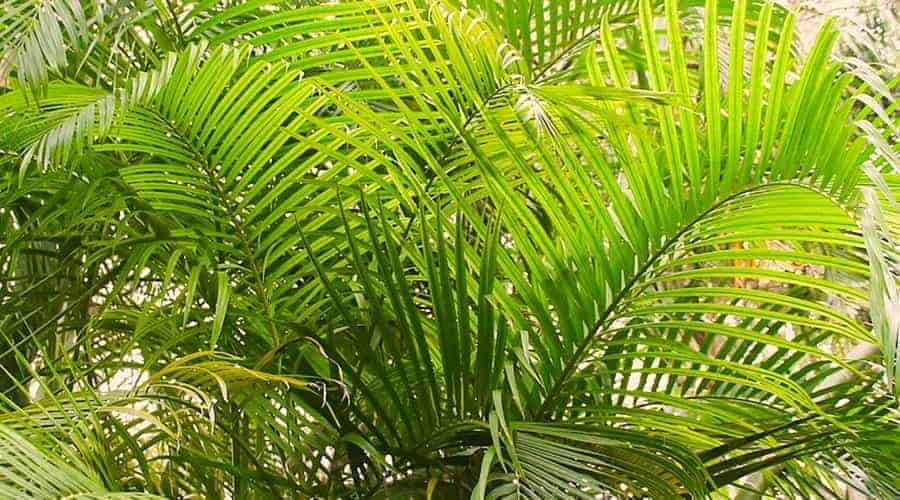 The leaflets grow out from the rachis (leaflet stem) at an angle. Making a V-shaped appearance to leaves.
The leaflets grow out from the rachis (leaflet stem) at an angle. Making a V-shaped appearance to leaves.Photo: David J Stang - CC BY-SA 4.0
The Trunk and Stems of the Gold Cane Palm
The trunk's diameter is 2-3in/5-7.6cm, which is pretty skinny! Two stunning traits many appreciate for their in-palm contrast:
- Stems on newest fronds are distinguished by the color. Ranging from darkest green, to yellow, to orange.
- Colored the same way on the main trunk, which has visible rings.
- Depending on the sunlight reaching them. The more sun, the more orangey-yellow they'll be.
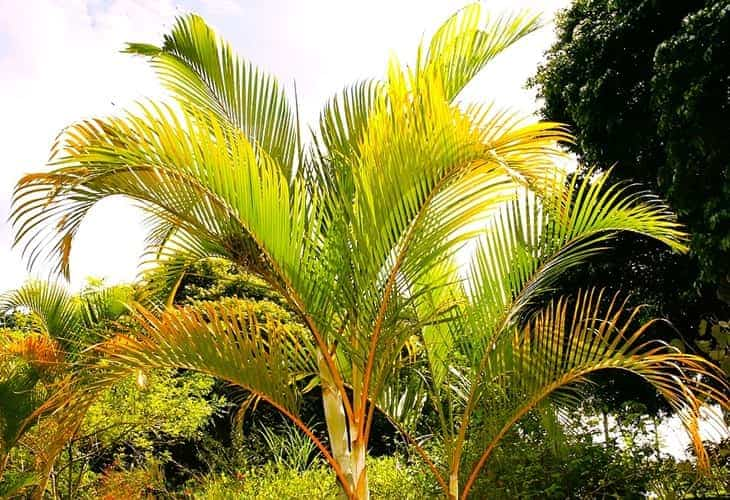 Good View of its Contrasting Yellowy Orangey Colors
Good View of its Contrasting Yellowy Orangey ColorsPhoto: David J Stang - CC BY-SA 4.0
- Its 3ft/0.9m tall crownshaft sits just below the crown. Slightly bulging at the bottom. With silvery grayish green tint.
With these shades of yellow, you can see how it's "golden cane" name arrived. In fact, the 2nd word of its scientifically named Dypsis lutescens (the epithet) means growing yellow in Latin.
Its cane-like, or bamboo-like trunk, for its striping has it also nicknamed Yellow Bamboo Palm.
Golden Cane Palm Care & Maintenance
A Golden Cane Palm Tree has its particular needs, whether inside or outside.
It hungers for bright sunlight to look its best: the ability to show its colors. As an indoor palm, it needs a nearby sunny westerly or southerly window.
It does like lots of water, but the soil it's planted in must drain well. For its Nutritional Needs, give it a Palm Specific Fertilizer with appropriate timing.
To show its outstanding Palm Parts (trunk, petioles & rachis [leaf stems]), Prune Your Palm by thinning. Because with thick growth, nipping some side shoots in the bud allows it to show its colors.
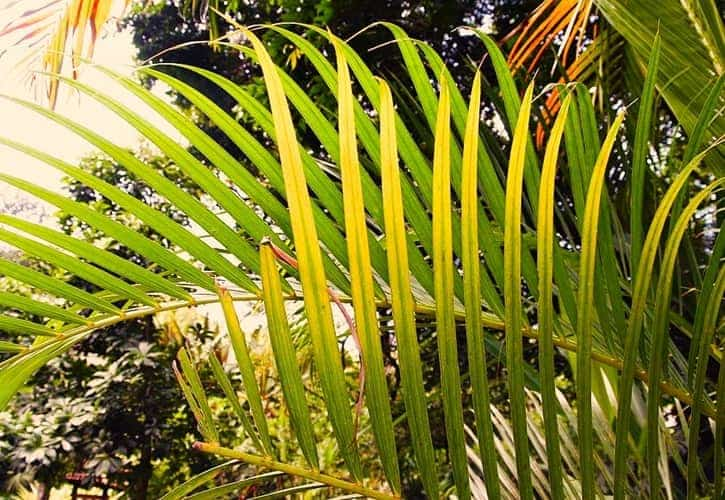 Digging out adjacent shoot roots helps visibility of golden fronds & trunk.
Digging out adjacent shoot roots helps visibility of golden fronds & trunk.Regrow Rooted Shoots if you'd like. Starting a whole new Golden Cane Palm while shaping the parent. ~~ Photo: David J Stang CC BY-SA 4.0
Planning to Get a Golden Cane Palm Tree?
Your Golden Cane Palm Purchase
You can find a place to Buy Your Golden Cane. They're available to order online. Likely, though, a nearby nursery or garden center carries them. Be sure they have a good reputation.
You should expect your palm to look healthy. Fronds with lots of Leaf Browning or unnatural sagging is a warning. It will already experience some trauma when you transplant it. Get its starting life with you on the right foot!
They cost around $40 & up, depending on size, shipping, etc. Look for a reasonable warranty.
Problem to Watch for on Your Golden Cane
Golden Canes are generally low-maintenance & easily grown. But...
Those Pesky Pests Can Attack!
The one weakness of Dypsis lutescens is a pest attack. One favoring the Golden Cane Palm Tree is spider mites. They love fronds when there's not enough humidity. Like indoors in winter.
So keep that in mind. Be proactively watchful for them. While providing the conditions that don't attract them.
Attend to Watching the Outdoor Weather
If a stormy weather event comes along, your outdoor golden cane palm could suffer damage. But don't overly worry, as they're relatively resilient. Often recovering from minor damage.
Trim off any fronds with broken petioles. If fronds or leaflets were frayed, leave them unless they begin showing signs of pest attack, or discoloring.
Very Well Itemized Problems With the Golden Cane! 🫤
Placements for Your Golden Cane Palm Tree
Now that your golden cane palm is about to come home, think about your aim for it. Will it be a Potted Palm for inside your home? Or do you have the right climate to grow one in your landscape?
Placing Dypsis lutescens into Your Outdoor Landscape
There are several Landscaping Design options to consider:
- Use it as a hedge. Since it has that clumping style. Plus it's tall & thick enough to allow for privacy.
- With careful thinning, you can shape it to look well as a focal point. It looks great by itself as a Palm for a Small Yard.
- It can look nice when several are planted 6ft/2.5m apart along a patio edge or a walkway.
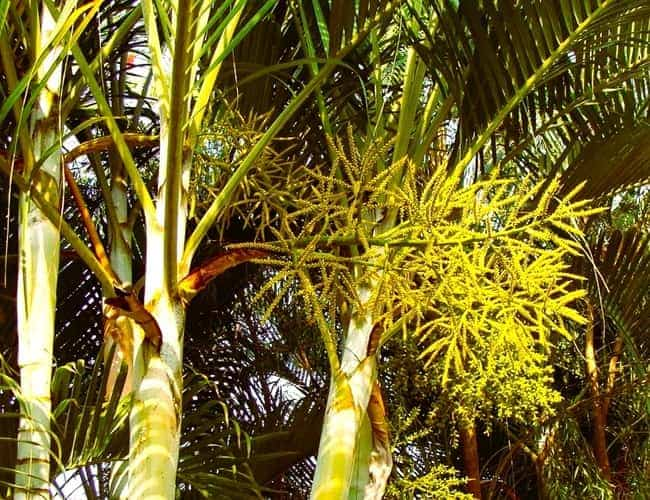 A Flowering Golden Cane Palm With the Branching Inflorescence
A Flowering Golden Cane Palm With the Branching InflorescenceConsider How its Yellow Flowers Would Look in Your Landscape
Bringing a Dypsis lutescens Palm Indoors
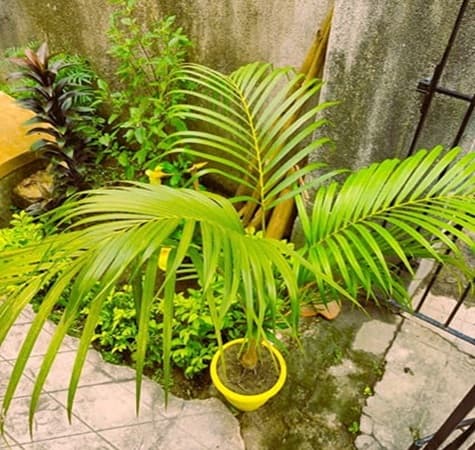 Golden Cane Palm View From Above
Golden Cane Palm View From AboveUsing this palm indoors may give your space a calming, stress-reducing aura. Only one of the reasons why they're a great addition to your home.
When growing your palm indoors, remember it needs to be near a bright window. If you have a sunroom, that's a fabulous place for it.
Recall its main vulnerability. The indoor environment is typically inviting to those pesky spider mites. In winter especially, when air moisture levels drop. Find ways to increase humidity to prevent these pests. For instance, a room humidifier.
Its lush green fronds are very useful inside, for their air-purifying properties. Taking in built up carbon dioxide & using that to create clean oxygen for breathing. That's How They Grow!
This palm is a real gem in the indoor ornamental plant world.
Takeaways for the Golden Can Palm Tree
Will you be adding a Golden Cane Palm Tree to your home or garden today?
We've seen that with some care & attention, this stunning plant can prosper for years to come. The golden cane palm is a wonderful choice for anyone to bring the tropical feel to their life.
